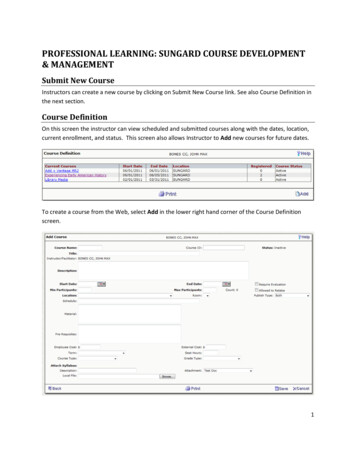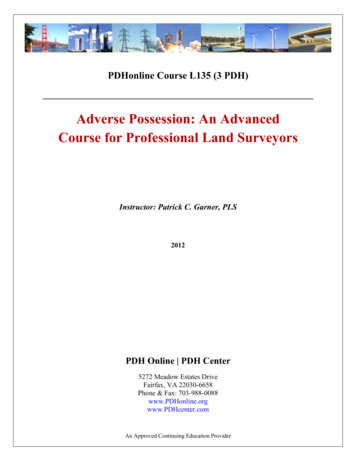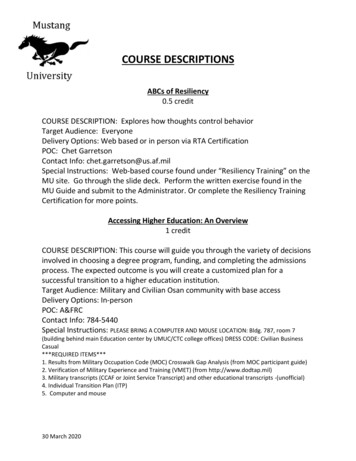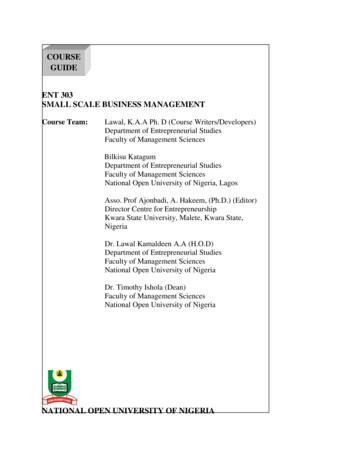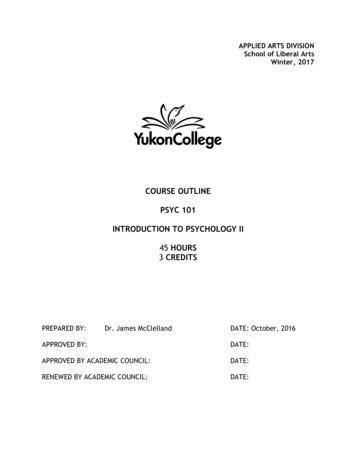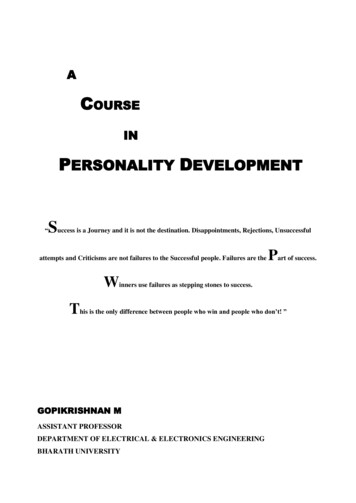
Transcription
ACOURSEINPERSONALITY DEVELOPMENTS“uccess is a Journey and it is not the destination. Disappointments, Rejections, Unsuccessfulattempts and Criticisms are not failures to the Successful people. Failures are thePart of success.Winners use failures as stepping stones to success.This is the only difference between people who win and people who don’t! ”GOPIKRISHNAN MASSISTANT PROFESSORDEPARTMENT OF ELECTRICAL & ELECTRONICS ENGINEERINGBHARATH UNIVERSITY
SYLLABUSUNIT IIntroduction to Personality DevelopmentThe concept of personality - Dimensions of personality – Theories of Freud & Erickson-Significance ofpersonality development. The concept of success and failure: What is success? - Hurdles in achievingsuccess - Overcoming hurdles - Factors responsible for success – What is failure - Causes of failure.SWOT analysis.UNIT IIAttitude & MotivationAttitude - Concept - Significance - Factors affecting attitudes - Positive attitude – Advantages –Negativeattitude- Disadvantages - Ways to develop positive attitude - Differences between personalities havingpositive and negative attitude. Concept of motivation - Significance – Internal and external motives Importance of self- motivation- Factors leading to de-motivationUNIT IIISelf-esteemTerm self-esteem - Symptoms - Advantages - Do's and Don’ts to develop positive self-esteem – Low selfesteem - Symptoms - Personality having low self esteem - Positive and negative self esteem. InterpersonalRelationships – Defining the difference between aggressive, submissive and assertive behaviours - Lateralthinking.UNIT IVOther Aspects of Personality DevelopmentBody language - Problem-solving - Conflict and Stress Management - Decision-making skills Leadership and qualities of a successful leader – Character building -Team-work – Time management Work ethics –Good manners and etiquette.UNIT VEmployability QuotientResume building- The art of participating in Group Discussion – Facing the Personal (HR & Technical)Interview -Frequently Asked Questions - Psychometric Analysis - Mock Interview Sessions.Total: 45 PeriodsText Books:1. Hurlock, E.B (2006). Personality Development, 28th Reprint. New Delhi: Tata McGraw Hill.2. Stephen P. Robbins and Timothy A. Judge(2014), Organizational Behavior 16th Edition: Prentice Hall.Reference Books:1. Andrews, Sudhir. How to Succeed at Interviews. 21st (rep.) New Delhi.Tata McGraw-Hill 1988.2. Heller, Robert.Effective leadership. Essential Manager series. Dk Publishing, 20023. Hindle, Tim. Reducing Stress. Essential Manager series. Dk Publishing, 20034. Lucas, Stephen. Art of Public Speaking. New Delhi. Tata - Mc-Graw Hill. 20015. Mile, D.J Power of positive thinking. Delhi. Rohan Book Company, (2004).6. Pravesh Kumar. All about Self- Motivation. New Delhi. Goodwill Publishing House. 2005.7. Smith, B . Body Language. Delhi: Rohan Book Company. 2004
UNIT IINTRODUCTION TOPERSONALITY DEVELOPMENTThe concept of personality - Dimensions of personality – Theories of Freud & EricksonSignificance of personality development. The concept of success and failure: What issuccess? - Hurdles in achieving success - Overcoming hurdles - Factors responsible forsuccess – What is failure - Causes of failure - SWOT analysis.1.1THE CONCEPT OF PERSONALITY- DEFINITION:“Personality is that pattern of characteristic thoughts, feelings, and behaviours that distinguishes oneperson from another and that persists over time”“It is the sum of biologically based and learnt behaviour which forms the person's unique responses toenvironmental stimuli”1.2DIMENSIONS OF PERSONALITY:The Big Five personality traits, also known as the five factor model (FFM), is a model based on commonlanguage descriptors of personality (lexical hypothesis). These descriptors are grouped together using astatistical technique called factor analysis (i.e. this model is not based on scientific experiments).This widely examined theory suggests five broad dimensions used by some psychologists to describe thehuman personality and psyche. The five factors have been defined as openness to experience,conscientiousness, extraversion, agreeableness, and neuroticism, often listed under the acronyms“OCEAN”.Dimension of PersonalityHigh LevelLow levelOpenness to experienceInventive, CuriousCautious, ConservativeConscientiousnessEfficient, OrganisedEasy going, CarelessExtraversionOutgoing, EnergeticSolitary, ReservedAgreeablenessFriendly, CompassionateCompetitive, OutspokenNeuroticismSensitive, NervousSecure, Confident
These five factors are assumed to represent the basic structure behind all personality traits. They weredefined and described by several different researchers during multiple periods of research.Employees are sometimes tested on the Big Five personality traits in collaborative situations to determinewhat strong personality traits they can add to a group dynamic. Businesses need to understand their peopleas well as their operations and processes. Understanding the personality components that drive theemployee behavior is a very useful informational data point for management.THE FIVE DIMENSIONS OF PERSONALITY: (THE FIVE FACTOR MODEL)a. Openness to experience: (inventive/curious vs. consistent/cautious):Openness to experience describes a person's degree of intellectual curiosity, creativity, appreciation for art,emotion, adventure, unusual ideas, curiosity, and variety of experience. It is also described as the extent towhich a person is imaginative or independent, and depicts a personal preference for a variety of activitiesover a strict routine. High openness can be perceived as unpredictability or lack of focus. Moreover,individuals with high openness are said to pursue self-actualization specifically by seeking out intense,euphoric experiences, such as skydiving, living abroad, gambling, etc. Conversely, those with lowopenness seek to gain fulfilment through perseverance, and are characterized as pragmatic and datadriven—sometimes even perceived to be dogmatic and closed-minded. Some disagreement remains abouthow to interpret and contextualize the openness factor.b. Conscientiousness (efficient/organized vs. easy-going/careless):Conscientiousness is a tendency to show self-discipline, act dutifully, and aim for achievement.Conscientiousness also refers to planning, organization, and dependability. High conscientiousness isoften perceived as stubbornness and obsession. Low conscientiousness is associated with flexibility andspontaneity, but can also appear as sloppiness and lack of reliability.c. Extraversion: (outgoing/energetic vs. solitary/reserved):Extraversion describes energy, positive emotions, assertiveness, sociability, talkativeness, and thetendency to seek stimulation in the company of others. High extraversion is often perceived as attentionseeking, and domineering. Low extraversion causes a reserved, reflective personality, which can beperceived as aloof or self-absorbed.d. Agreeableness: (friendly/compassionate vs. analytical/detached):Agreeableness is a tendency to be compassionate and cooperative rather than suspicious and antagonistictowards others. It is also a measure of one's trusting and helpful nature, and whether a person is generallywell-tempered or not. High agreeableness is often seen as naive or submissive. Low agreeablenesspersonalities are often competitive or challenging people, which can be seen as argumentative oruntrustworthy.
e. Neuroticism: (sensitive/nervous vs. Secure/confident).Neuroticism is a tendency to experience unpleasant emotions easily, such as anger, anxiety, depression,and vulnerability. Neuroticism also refers to the degree of emotional stability and impulse control and issometimes referred to by its low pole, "emotional stability". A high need for stability manifests as a stableand calm personality, but can be seen as uninspiring and unconcerned. A low need for stability causes areactive and excitable personality, often very dynamic individuals, but they can be perceived as unstableor insecure.1.3PERSONALITY DEVELOPMENT: Personality development includes activities that improve awareness and identity, develop talentsand potential, build human capital and facilitate employability, enhance quality of life andcontribute to the realization of dreams and aspirations. When personal development takes place in the context of institutions, it refers to the methods,programs, tools, techniques, and assessment systems that support human development at theindividual level in organizations. Personality development includes activities that develop talents, improve awareness, enhancespotential and looks to improve the quality of life. It involves formal and informal activities thatput people in the role of leaders, guides, teachers, and managers for helping them realize their fullpotential. Hence, it can be concluded that the process of improving or transforming the personality is calledpersonality development.1.4SIGNIFICANCE OR IMPORTANCE OF PERSONALITY DEVELOPMENT:Most people underestimate the importance of having a pleasing personality. Majority think it justmeans being born good-looking, that there isn’t anything much to do about it. But this is not true. Thescope of personality development is quite broad. It includes knowing how to dress well, social graces,grooming, speech and interpersonal skills. Whatever your career, these are very important skills that willpromote your objectives.To better appreciate its importance, some of the key benefits of developing your personality include thefollowing:a. Confidence:Personality development gives more confidence to people. When you know you are appropriately attiredand groomed, this makes you less anxious when meeting a person. Knowing the right things to say andhow to conduct yourself will increase your confidence.
b. Credibility:Personality development makes people more credible. Despite the saying that you don’t judge a book byits cover, people do tend to judge people by their clothing and how it is worn. This does not mean buyingexpensive clothes. We all know people who look shabby in expensive clothes. There are also people wholook great even if their attire is inexpensive. Because of this, you must know what to wear and you mustbe aware of other aspects of enhancing your physical features.c. Interaction:Personality development encourages people to interact with others. Studies have consistently shown thatpeople communicate more openly with people they are comfortable with. If your hygiene and socialgraces are unrefined, then expect to have a much harder time connecting with people.d. Leading and Motivating:Personality development enhances the capacity to lead and motivate. A person with a winning personalitywill be able to motivate better. People are less likely to get bored, and our ideas will have more credibility.We can lead better if we project an aura of confidence and credibility.e. Curiosity:A single wrong word can destroy a business relationship. Knowing the right things to say shows bothrespect and intellectual sophistication. This is especially the case if you are dealing with foreigners or ifyou conduct business outside the country. The right thing to do in our country could be horrible blundersin a different culture. These are the soft skills that may break or make a deal.f. Communication skills:It improves your communication skills. People are more receptive to what you say if they are impressedwith your personality. Verbal communication skills are also part of personality development; improvingyour speech will strengthen the impact of your message.You cannot win by talent and hard work alone. Personality development is a crucial ingredient that youmust obtain. Most of the people you see as models of great personality have taken a lot of effort indeveloping their natural features.
1.5THEORIES OF PERSONALITY:Many psychologists have developed theories about personality—how to describe it, how it emerges, whatinfluences it, how it changes, and what constitutes a healthy or an abnormal personality. Here you willlearn about the three most important personality theories: psychoanalytic theory, behaviourism andhumanism.The first of the modern personality theories was developed by Sigmund Freud and is known aspsychoanalytic theory. The psychiatric practice of this theory is called psychoanalysis. Freud’s ideas wereplentiful, profound, and often controversial. His theory about personality has had tremendous influence onsocieties around the world through many different disciplines. Not only psychology has been influencedand informed by the ideas of Freud, but also literature, art, philosophy, cultural studies, film theory, andmany other academic subjects. Freud’s theory represents one of the major intellectual ideas of the modernworld. Right or wrong, these ideas have had a lasting and enormous impact.1.5.1FREUD THEORY:Freud theorized that personality contains three structures—the id, ego, and superego—and that the mind islike an iceberg, the unconscious making up 90% while the conscious (like the tip of the iceberg floatingabove water) makes only 10% of the mind.Freud suggested an analogy about the mind. He said that the mind is like an iceberg in the ocean, floating10% above the water and 90% below. The unconscious, Freud proposed, makes up the vast majority ofour mind. In Freud’s view, only about 10% of our behaviours are caused by conscious awareness—about90% are produced by unconscious factors.According to psychoanalytic theory, most of what controls our behaviours, thoughts, and feelings isunknown to our aware minds. Normally, the unconscious guides us. Freud said that the mind could bedivided into three abstract categories. These are the id, the ego, and the superego.
1. The id:Latin for the term “it,” this division of the mind includes our basic instincts, inborn dispositions, andanimalistic urges. Freud said that the id is totally unconscious, that we are unaware of its workings. The idis not rational; it imagines, dreams, and invents things to get us what we want. Freud said that the idoperates according to the pleasure principle—it aims toward pleasurable things and away from painfulthings. The id aims to satisfy our biological urges and drives. It includes feelings of hunger, thirst, sex, andother natural body desires aimed at deriving pleasure.2. The ego:Greek and Latin for “I,” this personality structure begins developing in childhood and can be interpretedas the “self.” The ego is partly conscious and partly unconscious. The ego operates according to the realityprinciple; that is, it attempts to help the id get what it wants by judging the difference between real andimaginary. If a person is hungry, the id might begin to imagine food and even dream about food. (The id isnot rational.) The ego, however, will try to determine how to get some real food. The ego helps a personsatisfy needs through reality.3. The superego:This term means “above the ego,” and includes the moral ideas that a person learns within the family andsociety. The superego gives people feelings of pride when they do something correct (the ego ideal) andfeelings of guilt when they do something they consider to be morally wrong (the conscience). Thesuperego, like the ego, is partly conscious and partly unconscious. The superego is a child’s moralbarometer, and it creates feelings of pride and guilt according to the beliefs that have been learned withinthe family and the culture.Conclusion:Although these are known as structures, do not take the term literally. Freud did not mean that these arephysical parts of our bodies or our brains. He coined these terms and proposed this division of the mind asabstract ideas meant to help us understand how personality develops and works, and how mental illnessescan develop.Freud theorized that healthy personality development requires a balance between the id and the superego.These two divisions of the mind are naturally at conflict with one another: The id attempts to satisfyanimal, biological urges, while the superego preaches patience and restraint. The struggle between thesetwo is an example of intrapsychic conflict—conflict within the mind.According to psychoanalytic theory, defense mechanisms are automatic (unconscious) reactions to the fearthat the id’s desires will overwhelm the ego. Freud believed that a healthy personality was one in whichthe id’s demands are met but also the superego is satisfied in making the person feel proud and not
overwhelmed by guilt. If the id is too strong, a person will be rude, overbearing, selfish, and animalistic. Ifthe superego is too strong, a person is constantly worried, nervous, and full of guilt and anxiety and isalways repressing the id’s desires.An overly strong id makes one a psychopath, lacking a conscience, or an ogre, selfishly meeting one’sneeds without concern for others. An overly strong superego, on the other hand, makes one a worrier, aneurotic, so overwhelmed by guilt that it is difficult to get satisfaction.1.5.2ERIKSON THEORY:Erikson converted Freud’s emphasis to a focus on social relationships into eight psychosocial stages.These stages became known as the Eight Ages of Man. (As you know, at that time in history, the wordman was used to apply to all human beings.)Each of Erikson’s eight stages was described as a time of crisis—a time when the personality would goone way or the other. For example, you’ve likely heard of the identity crisis. Erikson theorized that duringadolescence, we all face a crisis of figuring out who we are. Each of the stages has this either-or quality.Erikson’s Psychosocial Stages: (Eight Ages of Man)1. InfantTrustBabies whose needs are met develop a feeling of trust for theversusenvironment. If infants have frustration and deprivation, they learn aMistrustbasic mistrust for the world that will stick throughout life.When toddlers learn to act independently and to control and doubt theirAutonomy2. Toddlerbodies (toilet training, walking, etc.), they learn self confidence and aversusfeeling of autonomy. Failure leads to feelings of inadequacy andShame3. Preschool4. Earlyschool agetherefore a sense of basic shame and doubt.InitiativeThe preschooler is ready to take action—in play, in imagination and inversusrunning his or her life. Success here leads to good self-esteem; problemsGuiltlead to feelings of guilt.The school-aged child is ready for learning many new skills and, ifIndustrysuccessful, will develop a sense of industry—being good at things.versusFailures at this stage result in a deep sense of being no good, of beingInferiorityinferior to others—a feeling that might carry into adulthood.Identity versus5. AdolescentRoleconfusionofAn adolescent is beginning to think abstractly and can conceptualize hisor her self-identity and personality. The adolescent begins to considerquestions of identity such as: Who should I be? What should I value?And what interests should I have? The teen must answer these to
develop a good sense of self-identity. Exploration of various roles andpersonalities is common in this stage.A young adult faces the challenge of developing close emotional6.Young adultIntimacyrelationships with other people. Here the term intimate does not meanversussexuality, but social and emotional connections with others. TheIsolationopposite result, for those who do not develop a sense of intimacy, is tobecome isolated from social contact.Middle-aged adults feel an urgency to leave a mark on the world, to7.Middle-agedadultGenerativitygenerate something of lasting value and worth. Finding a purpose in lifeversusis a central theme. To fail at generating something significant means aStagnationperson becomes stagnant and stops moving forward; this person maybecome selfish and self-absorbed.Integrity8. Old adultversusDespairIn old age, it is common to look back on life and reflect on what wasaccomplished. People who feel good about what they have done build asense of integrity. For those whose evaluations are not so good, there isdespair, the feeling of regret and remorse for the life they led.1.6CONCEPT OF SUCCESS:1.6.1DEFINITION:What makes a person successful? How do we recognize success?To some people, success might mean wealth. To others, it is recognition, good health, good family,happiness, satisfaction, and peace of mind. What this really tells us is that success is subjective. It canmean different things to different people.The best definition for success is“Success is the progressive realization of a worthy goal”Let's look at these definitions carefully. "Progressive" means that success is a journey, not a destination. We never arrive. After we reachone goal, we go on to the next and the next and the next. "Realization" means it is an experience. Outside forces cannot make me feel successful. I have tofeel it within myself. It is internal not external. "Worthy" refers to our value system. Which way are we heading? Positive or negative?Worthiness determines the quality of the journey. That is what gives meaning and fulfilment.Success without fulfilment is empty. "Goals" are important. Because they give us a sense of direction.
1.6.2GOALS:Why Goals are important?In a study conducted on students in the 1979 Harvard MBA program, only three percent of thegraduates had written goals and plans; 13 percent had goals, but they were not in writing; and 84 percenthad set no goals at all.Ten years later, the findings revealed that 13 percent of the class who had goals were earning upto 84 percent compared to those who had not set any. For the three percent who defined their goals andwrote them down, they were earning on average, ten times as much as the other 97 percent put together.Goal Setting:Most People don't know how to set goals. Some set goals that are too general. These are, in reality,fantasies common to everyone. Goals, on the other hand, are clear, written, specific, and measurable.Most People fear failure. Failure hurts, but it is often necessary to experience failure in order toachieve the greatest success. Do not unconsciously sabotage yourself by not setting any goals in whichyou might fail. They fear rejection. People are often afraid that if they are unsuccessful at achieving agoal, others will be critical of them. This is remedied by keeping your goals to yourself at the outset; letothers see your results and achievements once you've accomplished your goals.Some goals are called away from goals. These are usually framed in the negative. Here are a fewexamples. I don’t want to smoke anymore I don’t want to be unfit I don’t want to be overweight I don’t want to be brokeNow let’s reframe them in the positive I am a non smoker I am fit and healthy I am at my ideal weight I can cover my billsNotice the difference. They are stated in the positive and take on the assumption that you haveachieved it already. By assuming “as if” your behaviour changes so that you are acting like to havealready achieved what you wanted to do. What a great feeling to have even before you have got there. Italso bolsters your motivation.So now we have determined if our goal is towards something, or away from something. We havenow stated it in the positive. This however is still not a very well detailed goal. We will now look at howwe can make it more specific.
An ideal goal should be expressed in the positive, be time bound and specific. You may also liketo consider, how will you know when you have achieved it, what will it feel like, what will the peoplearound you be like? What will you do to celebrate it?A goal must be time bound. When do I want to have achieved it? If that’s when I want to achieveit, then when must I start? What is the first step I need to take? Who should I tell? Should telling thatperson be the first step? What skills or knowledge do I need to acquire along the way?Goal size, is the goal too big to achieve? If so then breaking it down into smaller bite sized piecesmay be the right approach.1.6.2FACTORS RESPONSIBLE FOR SUCCESS:1. Desire:The motivation to success comes from the burning desire to achieve a purpose.Napoleon Hill wrote, "Whatever the mind of man can conceive and believe, the mind can achieve."A young man asked Socrates the secret to success. Socrates told the young man to meet him nearthe river the next morning. They met. Socrates asked the young man to walk with him toward the river.When the water got up to their neck, Socrates took the young man by surprise and ducked him into thewater. The boy struggled to get out but Socrates was strong and kept him there until the boy startedturning blue. Socrates pulled his head out of the water and the first thing the young man did was to gaspand take a deep breath of air. Socrates asked, 'What did you want the most when you were there?" The boyreplied, "Air." Socrates said, "That is the secret to success. When you want success as badly as you wantedthe air, then you will get it." There is no other secret.A burning desire is the starting point of all accomplishment. Just like a small fire cannot givemuch heat, a weak desire cannot produce great results.2. Commitment:Integrity and wisdom are the two pillars on which to build and keep commitments.This point is best illustrated by the manager, who told one of his staff members, "Integrity is keeping yourcommitment even if you lose money and wisdom is not to make such foolish commitments."Prosperity and success are the result of our thoughts and decisions. It is our decision whatthoughts will dominate our lives. Success is not an accident. It is the result of our attitude.There is a big difference between playing to win and playing not to lose. When we play to win, weplay with enthusiasm and commitment; whereas when we play not to lose, we are playing from a positionof weakness. When we play not to lose, we are playing to avoid failure. We all want to win, but very feware prepared to pay the price to prepare to win. Winners condition and commit themselves to winning.Playing to win comes out of inspiration, whereas playing not to lose comes out of desperation.There are no ideal circumstances. There will never be. To reach anywhere we cannot just drift norlie at anchor. We need to sometimes sail with the wind and sometimes against it, but sail we must.
Ask any coach or athlete what the difference between the best and the worst team is. There would be verylittle difference in their physique, talent and ability. The biggest difference you will find is emotionaldifference. The winning team has dedication and they make the extra effort. To a winner, the tougher thecompetition3. ResponsibilityA duty which becomes a desire will ultimately become a delight. --George GritterPeople with character accept responsibilities. They make decisions and determine their own destiny in life.Accepting responsibilities involves taking risks and being accountable which is sometimes uncomfortable.Most people would rather stay in their comfort zone and live passive lives without acceptingresponsibilities. They drift through life waiting for things to happen rather than making them happen.Accepting responsibilities involves taking calculated, not foolish, risks. It means evaluating all the prosand cons, then taking the most appropriate decision or action. Responsible people don't think that theworld owes them a living.4. Hard Work:Success is not something that you run into by accident. It takes a lot of preparation and character.Everyone likes to win but how many are willing to put in the effort and time to prepare to win? It takessacrifice and self-discipline. There is no substitute for hard work.Henry Ford said, "The harder you work, the luckier you get."The world is full of willing workers, some willing to work and the others willing to let them.“I like to work half a day. I don't care if it is the first 12 hours or the second 12 hours.”--Kammons Wilson, CEO of Holiday InnOne cannot develop a capacity to do anything without hard work, just as a person cannot learn how tospell by sitting on a dictionary. Professionals make things look easy because they have mastered thefundamentals of whatever they do.“If people knew how hard I had to work to gain my mastery, it wouldn't seem wonderful at all.”--MichaelangeloAn executive called a company to check on a potential candidate. He asked the candidate's supervisor,"How long has he worked for you?" The man replied, "Three days." The executive said. "But he told mehe was with you for three years." The man replied, "That is right, but he worked three days."5. CharacterCharacter is the sum total of a person's values, beliefs and personality. It is reflected in ourbehavior, in our actions. It needs to be preserved more than the richest jewel in the world. To be a winnertakes character. George Washington said, "I hope I shall always possess firmness and virtue enough tomaintain what I consider the most valuable of all titles, the character of an honest man."
It is not the polls or public opinions but the character of the leader that determines the course ofhistory. There is no twilight zone in integrity. The road to success has many pitfalls. It takes a lot ofcharacter and effort not to fall into them. It also takes character not to be disheartened by critics.How come most people love success but hate successful people? Whenever a person rises aboveaverage, there will always be someone trying to rip him apart. Chances are pretty good when you see aperson on top of a hill, that he just didn't get there, but had to endure a tough climb. It's no different in life.In any profession, a successful person will be envied by those who are not. Don't let criticismdistract you from reaching your goal. Average people play it safe to avoid criticism, which can be easilyavoided by saying, doing or being nothing. The more you accomplish, the more you risk being criticized.It seems there is a relationship between success and criticism. The greater the success, the more i
These are the soft skills that may break or make a deal. f. Communication skills: It improves your communication skills. People are more receptive to what you say if they are impressed with your personality. Verbal communication skills
